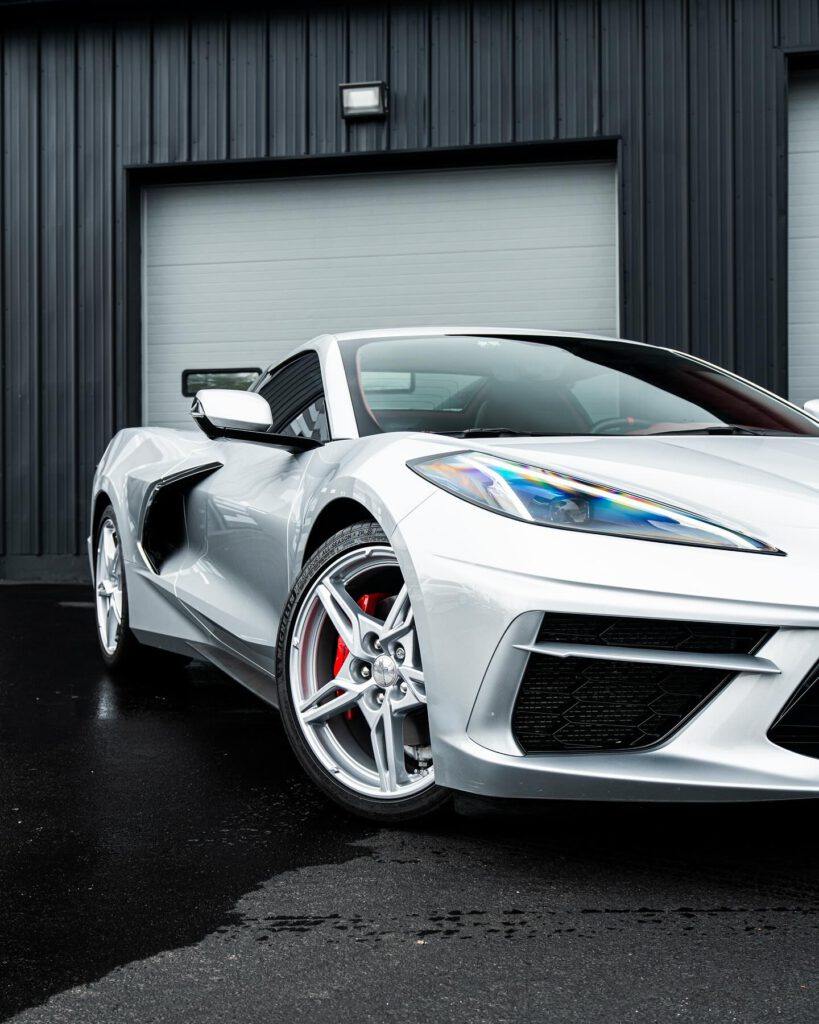When it comes to window tint for cars, finding the perfect shade can seem like an insurmountable task, but fear not—mastering this art is within your reach.
The right tint can transform your driving experience, offering benefits beyond just style.
As you navigate the sea of options and considerations, uncovering the nuances of tint darkness, UV protection, and essential regulations will be vital in achieving that elusive balance between aesthetics and functionality for your vehicle with Ceramic Pro Cleveland.
Key Takeaways
- Understand tint percentages for desired light transmission levels.
- Prioritize UV protection, heat rejection, and style balance.
- Comply with state regulations for tint darkness and restrictions.
- Opt for reputable brands, consider cost, and ensure proper maintenance for longevity.
Understanding Window Tinting Percentages
When selecting window tint for your car, understanding the different tinting percentages is essential to achieving the desired level of shade and privacy. Tinting customization options, such as those offered by window tint Cleveland, allow you to personalize your car’s appearance while providing functional benefits. The first step in choosing the right shade is to take into account the legal restrictions in your area. Each state has regulations regarding how dark you can tint your windows, so make sure you comply with these guidelines.
Window tinting percentages refer to the amount of light that can pass through the tinted windows. For example, a 5% tint means only 5% of light can penetrate, resulting in a very dark shade, suitable for maximum privacy. On the other hand, a 50% tint allows half of the light to pass through, providing a lighter shade with more visibility. By understanding these percentages, you can select a tint that aligns with your preferences and needs.
Tinting customization options go beyond just shade percentages. You can choose from various types of tint, such as carbon or ceramic films, each offering different benefits concerning heat rejection, UV protection, and glare reduction. Take into account your priorities, whether it’s heat control, UV ray protection, or enhanced aesthetics when deciding on the type of tint for your car. By exploring these options and understanding the tinting percentages, you can achieve the perfect balance of style, function, and comfort for your vehicle.
Benefits of UV Ray Protection
Protect your car’s interior and occupants from harmful UV rays by investing in quality window tinting Cleveland that offers effective UV ray protection. UV rays dangers are often underestimated, but prolonged exposure to these rays can lead to skin damage, fading of your car’s upholstery, and an increased risk of skin cancer.
Here are some key benefits of incorporating UV protection through window tint:
- Skin Protection: Quality window tint blocks harmful UV rays that can penetrate your car’s windows, reducing the risk of skin damage and skin cancer for you and your passengers.
- Interior Preservation: By blocking UV rays, window tint helps preserve your car’s interior, preventing fading, cracking, and deterioration of upholstery, dashboard, and other surfaces.
- Cooler Interiors: Window tint reduces the amount of heat entering your car, keeping the interior cooler and more comfortable, especially during hot summer days.
- Enhanced Driving Comfort: With UV protection, glare is reduced, making it easier for you to see the road, reducing eye strain, and enhancing overall driving comfort.
Investing in window tints with UV protection not only enhances the aesthetics of your car but also plays a significant role in ensuring the safety and well-being of you and your passengers.
Legal Regulations on Tint Darkness
To comply with legal regulations regarding tint darkness, it’s important to understand the specific limits set by authorities for window tint on vehicles. Regulatory compliance is critical to avoid fines or penalties. Tint darkness levels are typically measured by Visible Light Transmission (VLT) percentage, which indicates how much light can pass through the tint. Different regions have varying regulations, so it’s vital to check the laws in your specific area.
In most states, the front side windows must have a higher VLT percentage compared to the rear side windows and the rear windshield. For example, the front side windows may require a VLT of 70% or higher, while the rear windows and rear windshield may be allowed to have a darker tint with a VLT of 50% or lower. Some regions also have restrictions on the use of reflective or mirrored tints, which can be a safety hazard for other drivers on the road.
Ensuring that your vehicle’s window tint meets the legal requirements for tint darkness levels won’t only keep you on the right side of the law but also help maintain visibility and safety while driving. Be sure to consult local authorities or a professional tint installer to guarantee compliance with the regulations in your area.
Types of Window Tint Films
Exploring various types of window tint films can enhance the appearance and functionality of your vehicle while providing different levels of UV protection and heat rejection. When considering window tint films, keep in mind the following:
- Heat Reduction Technology: Some window tint films are specifically designed to reduce heat build-up inside your car, ensuring a more comfortable driving experience, especially during hot days.
- Longevity Guarantees: Certain brands offer window tint films with extended longevity guarantees, providing you with peace of mind regarding the durability and performance of the tint over time.
- Custom Design Options: For those looking to personalize their vehicle, many window tint films offer custom design options, allowing you to choose unique patterns or styles to suit your taste.
- Color Tint Variations: Window tint films come in a variety of color options, ranging from the traditional charcoal hues to more vibrant shades, enabling you to achieve the desired look for your vehicle while still benefiting from UV protection and heat rejection.
Selecting the right window tint film involves considering factors such as your aesthetic preferences, desired level of heat reduction, and the overall longevity of the product. By understanding the different types available, you can make an informed decision that aligns with both your style and functional needs.
Factors to Consider Before Tinting
Considering key factors before tinting your car windows is essential to guarantee the best results and compliance with local regulations. When planning for tinting, cost considerations play a critical role. The price can vary based on factors such as the type of tint film chosen, the size of your vehicle’s windows, and the brand options available in the market.
Before deciding on a tint, research different brand options to find one that offers the quality and shade you desire. Some brands may offer specific features like UV protection or enhanced durability, which could influence your choice. It’s important to select a reputable brand known for producing high-quality tint films to ensure longevity and performance.
In addition to brand considerations, think about the cost implications. Higher-quality tint films may come at a premium price, but they often provide better heat rejection and longevity. Cheaper options might save you money initially but could result in fading or peeling over time, necessitating a costly re-tinting job. Balancing your budget with the desired quality is key to making a well-informed decision when it comes to tinting your car windows.
Professional Installation Vs. DIY Kits
For best results and precision, comparing professional installation with DIY kits for tinting your car is essential. Here’s what you need to take into account:
- Cost Efficiency: Professional installations are generally more expensive upfront due to labor costs, but DIY kits can be cheaper. However, think about the long-term value and quality when making your decision.
- Time Commitment: Professional installation is quicker, usually done in a few hours. DIY kits require more time and precision, especially for first-timers. Think about how much time you can dedicate to the tinting process.
- Quality Assurance: Professionals have the experience to guarantee a flawless application with no air bubbles or wrinkles. DIY kits may lead to imperfections if not applied correctly.
- Warranty and Guarantees: Professional installations often come with warranties that cover issues like peeling, bubbling, or discoloration. DIY kits may not offer the same level of protection, so weigh your options based on the coverage you desire.
When deciding between professional installation and a DIY kit for tinting your car, take your budget, time availability, desired quality, and aftercare support into account. Ultimately, choose the option that aligns best with your preferences and needs for a satisfying tinting experience.
Maintenance Tips for Tinted Windows
To maintain the longevity and appearance of your tinted windows, regular cleaning, and gentle care are essential. When cleaning tinted windows, opt for mild, ammonia-free soaps and soft microfiber cloths to prevent scratching. Harsh chemicals or abrasive materials can damage the tint film, leading to peeling or discoloration over time.
Start by rinsing the windows with water to remove any loose debris. Then, apply the soapy solution using gentle, circular motions, ensuring all areas are covered. Finally, use a clean microfiber cloth to wipe away the soap residue and dry the windows thoroughly.
In addition to cleaning techniques, preventative care is important for maintaining tinted windows. Avoid using sharp objects near the windows that could scratch or puncture the film. When parking under direct sunlight for extended periods, consider using sunshades to reduce heat and UV exposure, which can degrade the tint film over time.
Regularly inspect the edges of the tint for any signs of peeling or bubbling, as addressing these issues promptly can prevent further damage.
Enhancing Privacy and Security
When you tint your car windows, you benefit from increased privacy as prying eyes find it difficult to see inside. Additionally, tinted windows offer security features by making it harder for potential thieves to spot valuables left inside your vehicle.
This added layer of privacy and security can enhance your overall sense of safety while driving or when your car is parked.
Privacy Benefits Highlighted
Enhancing vehicle tinting can greatly bolster the privacy and security of your car. When considering privacy benefits, custom designs offer a tailored solution to your needs. Here’s how tinted windows can enhance privacy and security:
- Increased Privacy: Tinted windows provide a shield from prying eyes, keeping your belongings hidden.
- Customized Tint Levels: You can choose the darkness of the tint for varying levels of privacy.
- UV Protection: Tinted windows not only offer privacy but also block harmful UV rays, protecting your skin and interior.
- Deterrent to Theft: By obscuring the view inside your car, tinted windows can deter potential thieves.
Enhance your car’s privacy and security with the right tinting choice.
Security Features Emphasized
Highlight the advanced security features that come with tinted windows for enhanced privacy and protection.
Tint technology not only provides a sleek appearance but also acts as a deterrent against theft by concealing valuable items inside your vehicle. The tinted film adds an extra layer of security by making it difficult for potential thieves to see inside, reducing the risk of break-ins.
Additionally, in case of an accident, the tint film can hold shattered glass together, preventing it from scattering and causing harm to passengers. This security feature enhances the overall safety of your car occupants.
Enhanced Sense of Safety
To enhance the sense of safety in your vehicle, consider how tinted windows provide increased privacy and security features. Tinted windows offer more than just a sleek look; they also contribute to your peace of mind on the road. Here’s how tinted windows can enhance your safety:
- Increased Visibility: Tinted windows reduce glare, allowing you to see clearly without straining your eyes.
- Enhanced Aesthetics: Tinted windows give your car a polished appearance while providing added security.
- Improved Privacy: Passersby won’t be able to easily see into your car, keeping your belongings safe from prying eyes.
- Increased Protection: Tinted windows can deter theft by concealing valuable items inside your vehicle.
Recap
Achieving the perfect shade for your car through window tinting involves understanding percentages, benefits of UV ray protection, legal regulations, types of films, factors to ponder, professional installation vs. DIY kits, and maintenance tips.
By enhancing privacy and security, tinted windows not only add style but also offer practical benefits. Remember, whether you choose a light tint or a dark one, proper maintenance is key to keeping your windows looking great for years to come.


